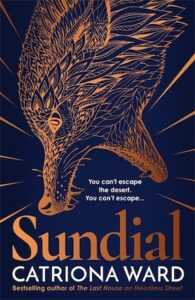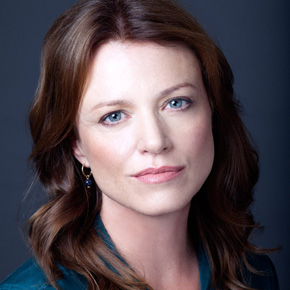The best time
by Karin Salvalaggio
“DO NOT MISS THIS BOOK.” Stephen King
Catriona Ward’s Sundial pushes the boundaries of psychological horror in pleasing ways. The prose is intelligent, highly observed and exquisitely toxic. Nothing is taboo. Children are slapped, dogs shot, the illusion of the perfect family shattered, and sisterly bonds broken. The writing is austere but substantial, the characters extreme but believable, and the settings beautiful but brutal. The characters’ circumstances may be extraordinary, but the themes explored in the book are universal. Ward taps into our greatest fears before violently shoving us down a dystopian rabbit hole in this unique portrayal of the modern, dysfunctional American family. If trigger warnings were required, the book’s cover would be full of bullet holes.
The family at the bottom of that rabbit hole live in a tidy suburban home in a good neighbourhood in a university town. The location is vague, but immediately familiar. Bucolic exteriors and anxious, status-conscious residents provide the perfect cover for a family born out of tragedy, but something is about to give. The intergenerational family trauma housed behind white picket fences and carefully tended lawns can no longer be contained.
In the opening chapter we meet Rob, a much-loved teacher and mother of two young daughters, Callie and Annie. Unhappily married to a scientist named Irving, Rob spends an inordinate amount of time and energy carefully tending a family that is falling apart at the seams. Irving appears to be having yet another affair and Callie is acting strangely. Worryingly, slaughtered animals have been appearing in the neighbourhood and Rob fears that her younger daughter Annie may be next. In an act of marital rebellion for which you sense there will be violent repercussions, Rob defies Irving and separates their daughters, reluctantly leaving Annie in her husband’s care. In a car packed with cheap offcuts of meat, Rob takes Callie deep into the Mojave Desert for a prolonged stay at her childhood home Sundial, which is also the site of an abandoned animal behavioural research facility. The extensive compound feels more like a trap than a refuge. The dog pens are gone but the high boundary fences remain. Worryingly, the raw slabs of meat that Rob throws over the fence in the evening are gone by morning. You sense that something malignant is out there watching and waiting, but you can’t begin to imagine what it is. All you know with any certainty is that there’s a very real possibility that Rob or Callie may never escape this place.
Nothing is as it seems. The tried-and-true tropes are discarded along with anything resembling a safety net. Ward expects a lot from her readers and gives a great deal in return.”
Rob is a highly contained woman who finds love and nausea indistinguishable, and living “intense and painful”. When stressed she creates elaborate decision-trees in her head. When she tells her children they are going to have “the best time”, it feels like a threat. She blossoms when teaching her students but is out of depth in the company of her faltering family. She wants to keep everyone she loves safe, but unlike Rob they’ve never been forced to hone the necessary survival skills. The reader senses that something traumatic happened in Rob’s past but can’t begin to fathom how her trauma could have been reflected back onto her two children in such a profound way.
Twelve-year-old Callie provides an equally compelling point of view. She uses emojis such as sad face, party hat and wine glass to punctuate her sentences and speaks in a way that is “pinched and effortful, as if she is being squeezed like an accordion”. Shirley Jackson’s Merricat Blackwood immediately came to mind when reading the chapters told through her eyes. Callie is clearly troubled. Her interest in death extends beyond an unnatural fascination with true crime and serial killers. She is a loner who has long conversations with an imaginary friend she calls Pale Callie and imaginary pet called Dumpster Puppy, both of whom appear to be dead. Callie’s portrayal is both tender and horrifying. An innocent with a capacity for evil, she is as much in the dark about the true purpose of their visit to Sundial as the reader. When her mother’s behaviour deteriorates, Callie is desperate to escape, but she is trapped in a desert with nowhere to run.
Whatever you believe may be going on when you begin to read Sundial will prove to be so far from the truth that you may as well have been reading the book through a telescope while sitting on a distant planet. This is where the novel excels. Nothing is as it seems. The tried-and-true tropes are discarded along with anything resembling a safety net. Ward expects a lot from her readers and gives a great deal in return. Sundial is a spiralling journey, moving in and out of the present and past and back again. Trauma begets trauma. The desert takes and takes but never seems to give. It may be a place where “the cold will kill you, if the day doesn’t” but at its heart Sundial serves as a flawed refuge – it is the “knowledge of safety drawing near, of warmth and walls, even as death strokes the back of your neck with a chilly finger.”
Book emoji. Scared cat face. Clapping hands.
 Catriona Ward was born in Washington, DC, grew up in the US, Kenya, Madagascar, Yemen and Morocco, and now lives in London and Devon. Her debut Rawblood won Best Horror Novel at the 2016 British Fantasy Awards, and was a WH Smith Fresh Talent title. Little Eve won the Shirley Jackson Award, was a Guardian best book of 2018 and won the Best Horror Novel at the 2019 British Fantasy Awards. Sundial is out now in hardback, eBook and audio download from Viper, with a paperback edition due in October 2022.
Catriona Ward was born in Washington, DC, grew up in the US, Kenya, Madagascar, Yemen and Morocco, and now lives in London and Devon. Her debut Rawblood won Best Horror Novel at the 2016 British Fantasy Awards, and was a WH Smith Fresh Talent title. Little Eve won the Shirley Jackson Award, was a Guardian best book of 2018 and won the Best Horror Novel at the 2019 British Fantasy Awards. Sundial is out now in hardback, eBook and audio download from Viper, with a paperback edition due in October 2022.
Read more
@Catrionaward
@ViperBooks
Author portrait © Robert Hollingworth
 Karin Salvalaggio is the author of the Macy Greeley crime novels Bone Dust White, Burnt River, Walleye Junction and Silent Rain and a contributing editor at Bookanista. Her fiction to date is set in towns that border the Montana’s wilderness, a uniquely spectacular landscape she fell in love with as a child. Her proudly independent characters inhabit stories about the American dream gone wrong. She is currently working on a crime novel set in California. Jessica Carson has returned to her conservative roots after working as a cop in Berkeley, one of America’s most liberal cities. The transition is not without difficulties. The police detective she’s replacing was involved in the 6 January riots and her estranged son has become immersed in Antifa.
Karin Salvalaggio is the author of the Macy Greeley crime novels Bone Dust White, Burnt River, Walleye Junction and Silent Rain and a contributing editor at Bookanista. Her fiction to date is set in towns that border the Montana’s wilderness, a uniquely spectacular landscape she fell in love with as a child. Her proudly independent characters inhabit stories about the American dream gone wrong. She is currently working on a crime novel set in California. Jessica Carson has returned to her conservative roots after working as a cop in Berkeley, one of America’s most liberal cities. The transition is not without difficulties. The police detective she’s replacing was involved in the 6 January riots and her estranged son has become immersed in Antifa.
karinsalvalaggio.com
More from Karin on Bookanista
@KarinSalvala

